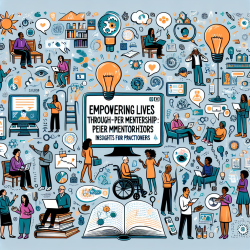Empowering Lives Through Peer Mentorship: Insights for Practitioners

In the realm of spinal cord injury (SCI) rehabilitation, peer mentorship has emerged as a beacon of hope and empowerment. The research article "Outcomes of peer mentorship for people living with spinal cord injury: perspectives from members of Canadian community-based SCI organizations" provides a comprehensive understanding of the multifaceted benefits and challenges of peer mentorship programs. As practitioners, integrating these insights can significantly enhance our ability to support individuals with SCI.
Positive Outcomes for Mentees
Peer mentorship offers a plethora of positive outcomes for mentees, including:
- Understanding: Mentees feel understood by someone who has walked in their shoes, creating a profound connection.
- Emotional Support: Provides an emotional outlet and psychological support, helping mentees navigate their new reality.
- Inspiration and Hope: Seeing someone thrive post-injury instills hope and motivation.
- Belonging: Fosters a sense of community and belonging, reducing feelings of isolation.
- Practical Guidance: Assists in navigating the healthcare system, regaining independence, and accessing resources.
Positive Outcomes for Mentors
Mentors also experience significant benefits, which include:
- Confidence and Pride: Mentoring boosts self-confidence and personal satisfaction.
- Purpose: Provides a sense of purpose and fulfillment.
- Personal Growth: Mentors process and cope with their own emotions through helping others.
- Gratitude: Positive reinforcement from mentees enhances the mentor's well-being.
Reciprocal Benefits
The mentorship relationship is mutually beneficial, fostering:
- Collective Benefit: Both mentors and mentees gain from the relationship.
- Shared Learning: Knowledge exchange enriches both parties.
- Community Building: Strengthens the sense of community and support network.
Challenges and Negative Outcomes
While the benefits are substantial, there are challenges that need addressing:
- Emotional Toll: Mentoring can be emotionally taxing, leading to compassion fatigue.
- Impact of Negativity: Negative interactions can affect mentors' mental health.
- Time and Energy Demands: Mentoring requires significant time and energy investment.
- Boundaries: Establishing boundaries can be challenging but is crucial for a healthy mentorship relationship.
Implications for Practitioners
As practitioners, we can enhance our support for individuals with SCI by:
- Encouraging Participation: Actively promoting peer mentorship programs and their benefits.
- Providing Training: Offering training to mentors to help them manage emotional tolls and set boundaries.
- Monitoring Outcomes: Systematically tracking both positive and negative outcomes to continuously improve the programs.
- Fostering Connections: Ensuring mentees and mentors are well-matched to foster meaningful connections.
To read the original research paper, please follow this link:
Outcomes of peer mentorship for people living with spinal cord injury: perspectives from members of Canadian community-based SCI organizations.
Citation: Sweet, S. N., Hennig, L., Shi, Z., Clarke, T., Flaro, H., Hawley, S., Schaefer, L., & Gainforth, H. L. (2021). Outcomes of peer mentorship for people living with spinal cord injury: perspectives from members of Canadian community-based SCI organizations. Spinal Cord, 59(12), 1301-1308. https://doi.org/10.1038/s41393-021-00725-2










